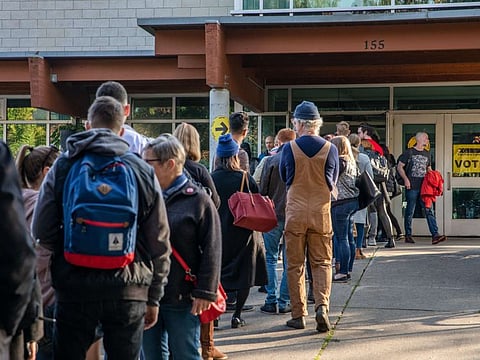Despite Liberal win, populism is brewing in Canada
Going forward it will be folly for Canadian politicians to stick fingers in ears and hum

It has become taboo in Canada’s established political circles to question what the world trading order has done to the country’s vaunted middle class. Vocally criticising free trade deals, such as the recently negotiated United States-Mexico-Canada Agreement, and denouncing them as harmful to middle-income workers, risks being ridiculed as “nativist” or “retrograde.”
Problem is, trade liberalisation has been at the root of decline for millions of Canadians over the past 30 years.
It’s a predicament that has left many of Canada’s mainstream politicians, heading into an uncertain federal election on October 21, in a Catch-22.
Each of the major parties, including the centrist Liberals and the left-leaning New Democratic Party, both which passionately opposed free trade deals during the late 1980s, claim to best represent middle-class voters. Canada’s middle class is in no different a position than middle-income earners in the United States and Britain. Many Canadians, like residents in both of the other countries, have become poorer.
A big chunk of these middle-class job losses have occurred in the manufacturing sector. About half a million production jobs in Canada have vanished since the start of 2000, according to Statistics Canada, while about four million jobs were lost in the United States over the same time period, according to the US Bureau of Labour Statistics. Automation is often blamed for these loses, but Canadians who are out of work point to another culprit. Their wages were too costly to fit into today’s global supply chains, which is built largely on cheap labour.
It’s folly for Canadian politicians to stick their fingers in their ears and hum.
Exodus of jobs
With limited new investment and seemingly endless plant closures, Canadian vehicle production has been stagnant for two decades. The sector has shed about a quarter of its work force. Trade liberalisation hasn’t only affected General Motors and other foreign auto companies that decided to migrate. Yet not a whisper of condemnation of the agreement was uttered by Canada’s major political parties. No one dared blame open trade, even though the door is wide for a further exodus of middle-class manufacturing jobs.
There’s no denying that Lighthizer’s boss is partly responsible for the free-trade hot potato, but seizing on that conflates the issues. Which could be strategic.
After an early instance of Trump vowing to rip up a global trade deal, Chrystia Freeland, then Canada’s trade minister, delivered an unsolicited rebuke against the growing anti-trade movement, calling it a threat not seen since the Great Depression.
“We’re living in an era of nativism and protectionism, something that I think is very dangerous for the world and for Canadians,” she told the Senate trade committee in late 2016.
Dropping an outrage bomb destroys any opportunity for candid discussion. It polarises the Canadian electorate to politicians’ peril. An Ipsos survey released ahead of the October 21 election found populist sentiment in the country on the rise, with 67 per cent of Canadians agreeing that “Canada needs a strong leader to take the country back from the rich and powerful.”
Already, a relative outsider has won office by speaking the language of populism. Ontario Premier Doug Ford’s campaign rhetoric blamed “his Liberal rivals for the economic insecurity plaguing those who are struggling,” says Frank Graves, president of Ekos Research.
Also Read: Singh relishes being Canada’s kingmaker
Ekos and The Canadian Press conducted a survey last year that reached the same ominous conclusion: populism is brewing.
Inside and outside the country, plenty of believers in globalisation are assuring each other that Canada is immune, Canada is different. Yet some of the middle-class electorate is already connecting their declining prosperity with the deals championed by Ottawa. How long until their frustration boils over? An even greater risk than real talk on free trade would be a tilt towards populism in future.
Justin Trudeau won a second term as Canada’s prime minister, but his narrow victory means he will lead a minority government. The Liberals were leading or victorious in 146 out of 304 electoral districts that reported results, according to the national broadcaster CBC.
Trudeau needed to win 170 seats to secure a second majority government. While Liberal power in Parliament is diminished, it’s still a win for the embattled prime minister.
— New York Times News Service
Jeff Rubin is a noted Canadian economist and author



